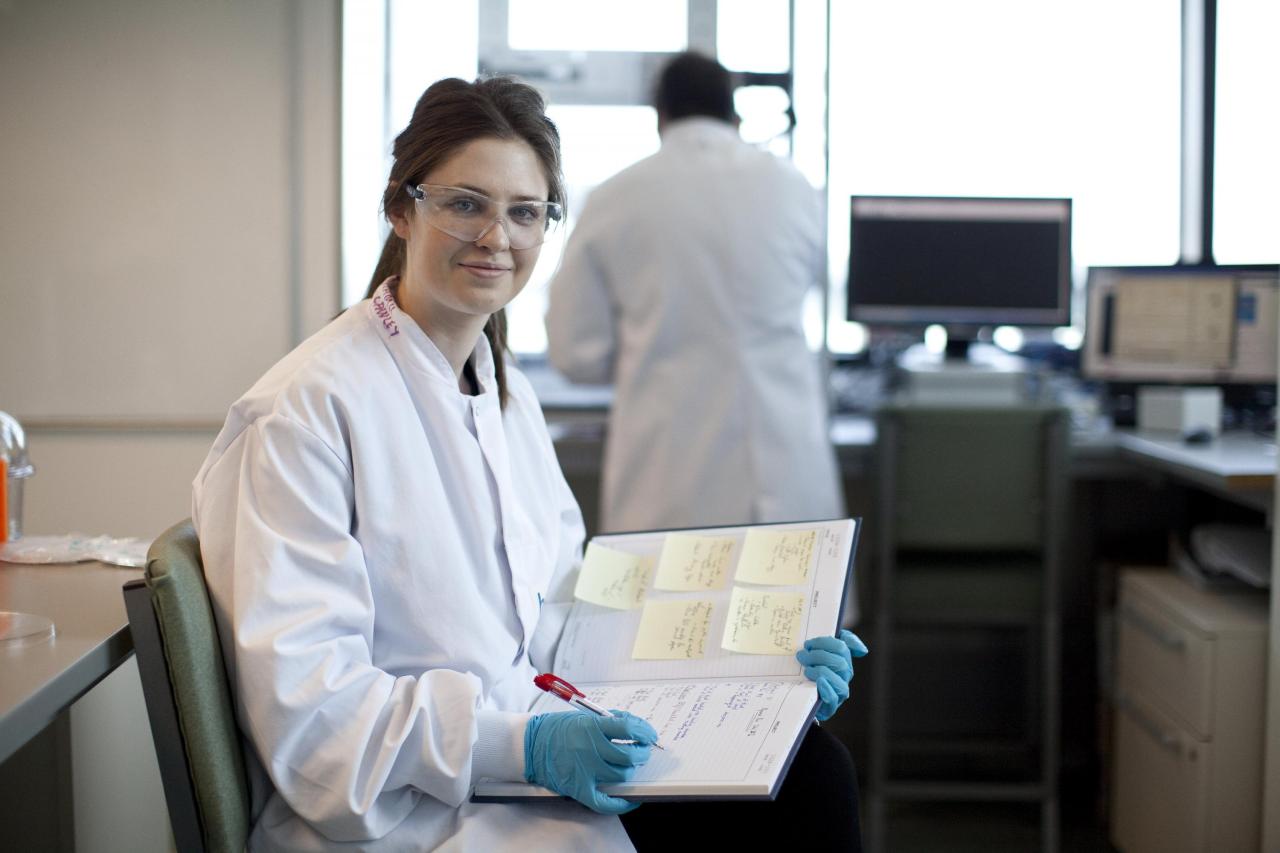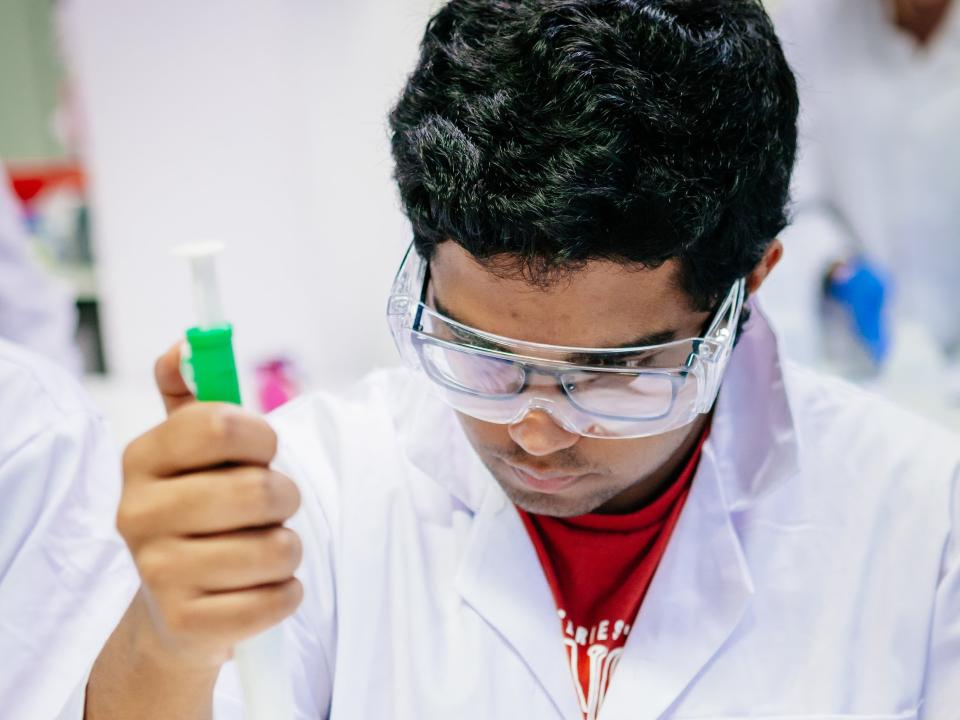Overview
Get the relevant scientific skills you’ll need to tackle these complex issues on this diverse and stimulating course.
Whether out on field trips or doing nanoscale environmental analysis in the lab, you’ll gain the analytical and practical skills to understand, protect and improve our environment. Not only that, but you’ll get to contribute in a practical way to reducing carbon on- and off-campus in our new module, Towards Zero Carbon.
Over the four years, you’ll gain a strong scientific core in biology, chemistry, physics and maths. This is vital to working as an environmental scientist, but also gives you flexibility when it comes to your career choice. In your third year, you’ll do a nine-month work placement and you also have the chance to study abroad. And of course, throughout the course, you’ll be able to contribute practically to reducing carbon reliance.
As the world is ever more focused on protecting the environment and cutting carbon emissions, there is ongoing and increasing demand for qualified scientists. Graduates from this course typically go on to high-impact careers as research scientists in areas such as environmental protection, and water, air and soil management and conservation.
Why DCU
DCU People

My research interests lie in carbon cycling in soils, sediments and water. We study carbon in different natural forms and investigate how it cycles between phases (in air, soil and water).
Read more about Dr Brian Kelleher

I chose the BSc in Environmental Science and Technology in DCU as it focuses on the innovative technological advancements that can help solve environmental and climate problems as well as on the re
Read more about Chloe Martin
Careers & Further Options
Careers
The potential careers in environmental science and technology are diverse. The following are just some examples:
- Any area of environmental research, e.g. global warming, local or regional air, water and soil pollution in universities, public bodies such as the county councils and industry (e.g. Techworks Marine)
- Environmental protection roles in industry such as pharmaceutical (e.g. Bristol Myers Squibb), manufacturing (e.g. Ipsen Manufacturing Ireland Ltd), semi-conductor (e.g. Intel), the County Councils, the Environmental Protection Agency (EPA) and consultancy companies
- Waste management roles in companies such as Enrich Environmental Ltd and Covanta
- Water protection and wastewater treatment in, for example, the county councils Inland Fisheries Ireland, the Geological Survey of Ireland and private consultancy companies such as Aquafact International Services Ltd
- Environmental analytical roles in companies such as IAS Laboratories and public bodies such as Irish Water and Teagasc
- Environmental advocacy for entities such as An Taisce and Global Action Plan
- Parks and Wildlife officer in, for example, the National Parks and Wildlife Service
- The marine industry, e.g. BIM, Altemar Environmental consultants
- Research funding bodies such as Science Foundation Ireland (SFI)
- Green Economy, e.g. The Green Economy Foundation
- The agricultural industry, e.g. environmental officer with the Department of Agriculture, EPA and the many consultancies involved in this industry
DCU graduates are highly sought after by employers. Our Graduates work in environments ranging from large multinationals to SMEs, family businesses and start-ups across every sector.
DCU Careers Service has a number of learning and development initiatives in place for our students, giving them the skills they need for a successful career path.
Entry Requirements
In addition to the general entry requirements for admission to the university the following entry requirements apply
Minimum of O3 or H6 in Mathematics and minimum of O3 or H5 in one of Physics, Chemistry, Biology, Physics with Chemistry, or Agricultural Science.
In addition to the general entry requirements for admission to the university the following entry requirements apply
Minimum of O3 or H6 in Mathematics and minimum of O3 or H5 in one of Physics, Chemistry, Biology, Physics with Chemistry, or Agricultural Science.
In addition to the general entry requirements for admission to the university the following entry requirements apply
GCE A Level D or GCE AS Level C or GCSE B Mathematics and GCE A Level D or GCE AS Level C or GCSE B in one of Physics, Chemistry, Biology, Physics with Chemistry or Agricultural Science
Please visit our Admissions webpage for details on course requirements or how to apply to DCU.
Please visit our QQI FET webpage for details on DCU courses, open days, campus tours or school visits.
To apply to DCU, please visit www.cao.ie.
Mature entry is a competitive process. Applicants must demonstrate:
- a genuine interest in the programme(s) they are applying for
- academic experience and competency in their chosen field of study
- an ability to engage and succeed on the programme
All applicants must complete a statement of interest to be considered for the mature application route.
For further guidance on the mature application process please see the CAO Website
Applicants that have completed at least one year of study at NFQ Level 6, 7 or 8 at another institution may apply to continue their studies on a similar programme at DCU. There should be substantial overlap in content between the two programmes to be considered for a transfer. Results and other supporting documentation must be submitted to CAO by the closing date of 1st July. This is a competitive application process for a small quota of advanced entry places. Offers are made on a rolling basis until all places are filled. Early application is advised. Please note: Applicants should also consider applying through the appropriate route for first year entry to the programme they are interested in. This application process is only for advanced entry.
International candidates are expected to have educational qualifications of a standard equivalent to those outlined above. In addition, where such candidates are non-native speakers of the English language they must satisfy the university of their competency in the English language. For further information on international applications click here.
Course Structure
- Chemistry, Physics, Biology Laboratories
- Mathematics
- Chemistry
- How Life Works
- Interdisciplinary and Environmental Science
- Physics
- Field Trip
- Pollution and the Biosphere
- Environmental Chemistry, Biotechnology and Physics Laboratories
- Microbiology and Genetics
- Towards Zero Carbon
- Visualisation and Validation of Lab Data
- Biomolecules and Metabolism
- Physics of Renewable Energy
- Kinetics and Thermodynamics
- Environmental Analysis
- Probability and Statistics
- Programming
- Field Trip
- Atmospheric and Sound Physics
- Separation Techniques
- Analysis of Environmental Samples
- Modelling with Differential Equations
- Bioanalysis
- Environmental Biotechnology
- Climate and Aquatic Science
- Environmental Monitoring and Data Analysis
- INTRA (work experience)
- Environmental Ethics
- Literature Review
- Environmental Toxicology
- Environmental Organic Chemistry
- Water and Waste Management
- Soil and Energy Science
- Analytical Applications
- Project
Fees and Funding
Fees
How To Apply
Applicants presenting EU School Leaving/FETAC Level 5 examinations: Apply through the Central Applications Office (CAO) by 1st February or 1st May
To apply for this programme:
Candidates should apply directly here. Here's a quick step by step guide if you need help with your application.
Please provide
- Academic Transcripts for each and every year of study with English translation, if applicable.
- If applicable, provide evidence of competence in the English language as per DCU entry requirements.
Applications are accepted on an ongoing basis up to 1st July. All Non-EU candidates are advised to apply early, as places are limited.
All mature applicants apply through the CAO by 1st February. For further information and for special application procedures for mature students, please click here
Applications are made via the CAO Advanced Entry route which will open on the 5th November to 1st July.
Please see Application Procedures or E-mail ugadmissions@dcu.ie.
Candidates submitting EU examination results are required to apply through the CAO at www.cao.ie
Candidates submitting non-EU examination results are required to apply directly here
Life On Campus
At DCU, our students can expect a unique campus experience. We are known for our excellent teaching and learning facilities, our active clubs and societies, and our great social and sporting facilities. All this makes DCU an exciting place to be.
DCU has three academic campuses; Glasnevin, St. Patrick’s and All Hallows (both in Drumcondra), all close to Dublin City centre.
They can be reached by public transport, Dublin Bus and Bus Éireann, with our Drumcondra campuses a ten minute walk from Drumcondra Train Station. Glasnevin is a 20 minute walk from St Patrick’s and All Hallows. They are also linked by Dublin Bus.
Each campus has a library (O’Reilly, Cregan and Woodlock Hall), study spaces, restaurants, and on-campus residencies. There are sports facilities on Glasnevin and St. Patrick’s, and there is a dedicated sports campus, St Claire’s, located near Glasnevin on the Ballymun Road.
DCU’s 19,000 students have access to exceptional teaching and learning facilities across our three academic campuses.
These include modern learning theatres, research centres, a new media and TV studio, radio/podcast studios, computer suites and advanced labs in the areas of Languages, Engineering, Physics, Chemistry and Biotechnology, as well as a Sports Performance centre and a training hospital ward. In 2021, we opened our first virtual reality ‘Leadership Lab’, which is located in our Business School.
We continue to improve and update our facilities. For example, construction of a new world-class STEM facility is underway on the Glasnevin campus. With capacity for an extra 3,000 STEM students, this facility will advance DCU’s international reputation for excellence in science and health, computing and engineering disciplines.
Studying in DCU isn’t just about course work. The university is rich in student life and activities.
There are more than 140 clubs and societies for students in DCU, with ‘Clubs & Socs’ days taking place on both the Glasnevin and Drumcondra campuses at the start of the academic year. They span everything from rugby to rock climbing, anime to jazz.
For many students, sport is an important part of the DCU experience. DCU’s Sports Complex boasts a 25 metre swimming pool, fitness centre gym, all-weather pitches and squash courts, as well as soccer, GAA and rugby pitches. DCU Dóchas Éireann, the university’s GAA club, is the largest third level Gaelic Games club in the country. Meanwhile, DCU Athletics has been Ireland’s highest achieving university club for many years. And DCU has dozens of other clubs to get involved in, from Archery to Weightlifting.
The Glasnevin campus is home to our purpose built, state-of-the-art student centre, The U, which serves the needs of a rapidly growing student body. Here, you will find the Student Leadership and Lifeskills Centre, performing arts and cultural spaces for students and the wider community, and the Entrepreneurship and Innovation Hub. Also located on our Glasnevin campus is The Helix, our renowned performing arts centre.
On our St Patrick’s campus, we have the Java Student Hub, a vibrant, warm and welcoming space where students can meet for coffee, play music, use the projector to watch events, or just relax. The walls of the Java Hub were designed based on the cultural history of St Patrick’s Campus, including the special references to the notable sporting history and history of the arts.
We have a number of academic, professional and social supports for students.
Student Advice & Learning Skills Centre - Offers a wide range of supports and services to students and advice
The Writing Centre - drop-in writing workshops for students through the academic year
Maths Learning Centre - provides maths support for students of all ability levels with maths modules
Student Learning - facilitate the transition from passive to active learning for students at DCU, by teaching study skills, nurturing critical thinking and building student confidence.
Careers work with students to help them on their professional journey into graduate employment.
Our student support team offers a comprehensive support programme, helping students make that all important transition into university life and focusing on building confidence and skills which are key to success at third level.

DCU Glasnevin Campus
FAQs
What do I study in the Bsc environmental science and technology?
In this programme you will study Biology, Chemistry, Physics as well as some Mathematics.
How long is the programme?
The programme is a four years Honours degree.
What can I do after the bsc environmental science and technology course?
Graduates from our program have the necessary background to work in areas as diverse as:
- Waste management,
- Pollution control,
- Environmental monitoring
- Health and safety
You could also find yourself working for a local authority, an NGO, the Environmental Protection Agency, or an environmental consultancy.
Is DCU all one campus?
DCU is a multi campus university - the Glasnevin, St Patrick's and All Hallows campuses. The St Patrick's campus is where the Education courses are taught and some of the subjects from the BA Joint Honours degree. There is a 20-25 minute walk between the campuses but there are buses and bikes available to go between them also.
Click here to see maps of all of our campuses
If I'm studying on the St Patrick's campus, can I use the library and sports centre on the Glasnevin campus?
Yes, all facilities such as sports and accommodation are open for all DCU students to avail of.
Are there libraries in DCU and if they have wifi and work stations?
We have a brand new state of the art four floor library on our St. Patrick's Campus which complements the existing library on the Glasnevin campus. There is free wifi, work stations as well as desktop computers.
Does DCU provide accommodation?
DCU does have on-campus accommodation for undergraduate and postgraduate students, and you can find out more and apply via the Accommodation Office webpage.








